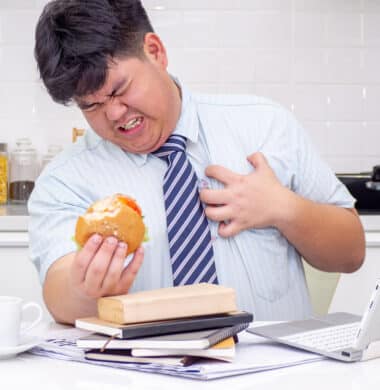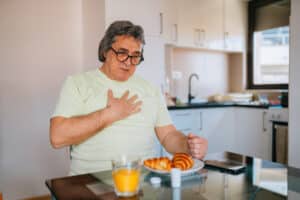Why Does My Heart Rate Increase After Eating?

Key Takeaways:
It’s common to experience a faster heart rate after eating, often caused by digestion, certain foods, or stimulants like caffeine and alcohol. While usually harmless, frequent palpitations can indicate conditions such as anemia, thyroid issues, or heart disease. Recognizing triggers, making dietary and lifestyle changes, and seeking medical care when symptoms persist are important for protecting heart health.
If you occasionally experience an increased heart rate after eating, you’re not alone. This condition, also referred to as having heart palpitations after eating, is quite common. While it’s understandable that you might find an increased heart rate after eating to be a little scary, the good news is that in most instances it isn’t a cause for concern.
Common Symptoms of an Increased Heart Rate After Eating
You may experience the following symptoms when you have an increased heart rate after eating:
- Heart Fluttering – You may feel a fluttering sensation in your chest, as if your heart is doing flips
- Heart Pounding – Your heart may feel like it’s beating very hard, and in some instances, you may be able to hear this heart pounding in your ears
- Irregular Heartbeat – Your heart may feel like it’s skipping a beat or beating out of rhythm
10 Reasons Why Your Heart Rate May Increase After Eating

- Digestive Process – During and immediately following a meal, your body sends additional blood to your stomach and other digestive organs to assist in the breakdown of food and absorption of nutrients. This process forces your heart to work harder, which can cause a temporary increase in your heart rate.
- Food Composition – In some instances, the types of foods or other substances you ingest can result in an increased heart rate (more on specific foods that may trigger this condition below).
- Sympathetic Nervous System Activation – When you eat large or carbohydrate-rich meals, it can activate the “fight-or-flight” response associated with your sympathetic nervous system. This can cause an increased heart rate and a spike in your blood pressure.
- Medications – Certain medications may cause an increased heart rate when taken with food. These include allergy and cold medicines, antibiotics, diet pills, heart disease medications, blood pressure medications, insulin and thyroid medications.
- Dehydration – If you’re dehydrated at mealtime, it can cause your heart rate to spike.
- Stress or Anxiety Around Mealtimes – Feeling stress or anxiety before, during or immediately after a meal can cause an increased heart rate.
- Alcohol Consumption – Drinking alcohol can impact your heart’s rhythm, resulting in an arrhythmia (irregular heartbeat) or heart palpitations.
- Anemia – Anemia is a condition that causes a low red blood cell count. It often develops due to a lack of iron in your diet, and it can trigger an increased heart rate after eating.
- Underlying Heart Conditions – Certain heart conditions can make you more prone to an increased heart rate after eating. These include cardiomyopathy, coronary artery disease and atrial fibrillation.
- Hormonal Imbalances – Hormonal imbalances can trigger an increased heart rate after eating. This is especially common in women who are pregnant or going through menopause.
Common Foods and Substances that Can Trigger an Increased Heart Rate After Eating

- Sugary Foods – Sugary foods, drinks and desserts can cause your blood sugar to spike and then rapidly drop again. This can trigger the release of adrenaline, leading to an increased heart rate.
- High-Carbohydrate Foods – Foods with a high carbohydrate content can cause your blood sugar levels to fluctuate. This can cause an increased heart rate in people with hypoglycemia or insulin resistance.
- High-Sodium Foods – Processed foods that are high in sodium can cause your blood pressure to spike and trigger an increased heart rate.
- Spicy Foods – Spicy foods can stimulate your nervous system, increasing your heart rate.
- Foods Containing MSG – Certain processed foods and restaurant meals contain monosodium glutamate (MSG), which can trigger an increased heart rate in people who are sensitive to this flavor enhancer.
- Caffeine – Caffeine is a stimulant that can increase your heart rate after consuming it. This is especially common when consuming large amounts of caffeine.
- Fatty and Fried Foods – These foods can slow digestion and trigger acid reflux, which is a potential cause of heart palpitations.
- Dietary Supplements – Taking certain dietary supplements with meals can potentially increase your heart rate. These include ephedra, ginseng, hawthorn, valerian and bitter orange.
When to See a Cardiologist for an Increased Heart Rate After Eating
In most instances, an increased heart rate after eating isn’t a cause for concern and can be managed by implementing a series of lifestyle changes (more on these below). However, you may want to visit a cardiologist for diagnostic testing if you experience this condition frequently, as it could be a sign that you may have an underlying issue such as arrythmia, anemia, thyroid disorder or some other cardiovascular problem that requires ongoing monitoring.
In addition, it’s important to seek medical attention promptly if an increased heart rate after eating is accompanied by the following symptoms:
- Chest pain
- Dizziness or lightheadedness
- Difficulty breathing
- Fainting
- Heart palpitations that last longer than a few minutes
These symptoms may be a sign that you have a heart condition that requires immediate medical treatment.
Lifestyle Changes to Reduce the Risk of an Increased Heart Rate After Eating

- Manage stress and anxiety to reduce the likelihood that your body’s “fight-or-flight” response will get initiated during mealtimes
- Eat slowly to reduce strain on your digestive system that can increase the likelihood of an increased heart rate
- Get plenty of exercise since regular physical activity can improve your overall cardiovascular health and help control stress or anxiety
- Maintain a heart-healthy weight
- Drink plenty of fluids since dehydration can contribute to changes in your heart rate
Dietary Changes to Help Reduce the Risk of an Increased Heart Rate After Eating
Since the specific foods you consume often play a major role in developing an increased heart rate after eating, making certain changes to your diet can help you to minimize the frequency of this condition. Limiting your intake of the following foods and substances can help reduce your risk of an increased heart rate at mealtimes:
- High-sugar and high-carbohydrate foods
- Processed and salty foods
- Spicy or very rich foods
- Stimulants such as caffeine
- Alcohol
It’s also important to remember that eating large meals requires more blood flow to complete the digestive process. This can place stress on your cardiovascular system. Eating smaller meals can reduce the blood flow required during digestion, minimizing the likelihood that you’ll develop an increased heart rate.
It’s also a good idea to keep a food and symptom diary. Tracking what you eat and the timing of your symptoms can help you identify foods that are specific triggers for an increased heart rate, making it easier to know which foods to eliminate from your diet.
South Denver Cardiology Can Help You Live a Heart Healthy Life
At South Denver Cardiology, we’re committed to providing the comprehensive services you need to live a heart healthy life. This includes diagnostic testing to identify any potential cardiovascular conditions that may need to be monitored or treated, as well as a wide range of clinical cardiology services to treat just about any heart condition you may have.
If you’re concerned about an increased heart rate after eating, our team can conduct the diagnostic testing necessary to determine whether this condition is a cause for concern. If it can be corrected with lifestyle changes, our team can help you develop a plan to incorporate these changes into your routine. This may include taking advantage of the following services we offer:
- Nutritional consulting services to adopt a diet that removes foods that may potentially trigger an increased heart rate
- Medical fitness gym to establish a heart healthy exercise routine
- Mind/body studio to help manage stress that may be contributing to your increased heart rate
- Medical weight loss clinic to help you achieve a heart healthy weight
Contact us today to schedule a consultation. South Denver Cardiology serves patients in South Denver, Littleton and the surrounding areas.
- How Cold Weather Affects Your Heart - December 29, 2025
- 10 Lifestyle Changes You Can Make to Optimize Your Heart Health in 2026 - December 18, 2025
- 7 Tips for Heart Healthy Holiday Eating - December 11, 2025
Sign Up
As with any health concerns, your specific treatment program should be discussed thoroughly with your primary care physician as well as any specialists who may need to be consulted – like a cardiologist.
Sign Up
